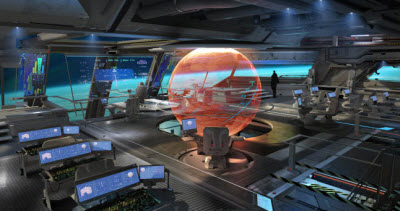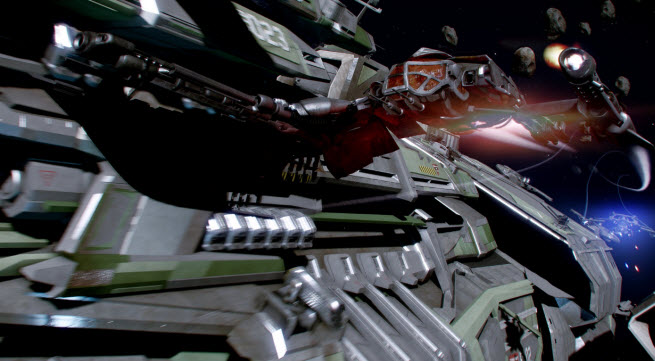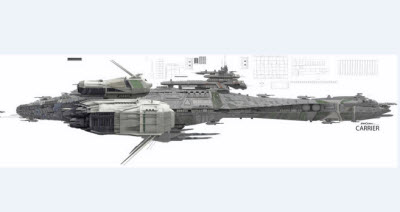GamesBeat: You run a long way and then you get killed again. Or in Air Warrior, you had to fly for an hour to get back into the battle. It almost seems like with a space-based universe, that could be a problem.
Roberts: In the game, if you lose a dogfight, you can eject. Then you’ll be drifting in space and get recovered and you’ll go back to the last planet you were on. If you have an insurance policy your new ship will be waiting for you. You do have the ability to go back and do it again. But I feel like you also need a bit more than that. There needs to be some wear and tear that goes on.
The idea behind the mechanic goes back to the old-school idea of lives, almost. If you eject and get recovered and go back, you haven’t lost a life. If you don’t manage to eject in time and the ship blows up, or you get shot in the head boarding another ship, or someone shoots your pilot as he’s floating waiting to be picked up, then it’s almost like you’ve lost a life. This is in the future, so we can probably bring people back from points where we couldn’t do it now. You’d wake up in a med bay and you now have a cybernetic arm replacement or something. Most of the time you should be ejecting. All the rest you won’t even get to this point. But after a while of doing this, your body just gives out and that character’s dead. Then you start again.
The thing is, in Star Citizen, if you think of it in role-playing game terms, your ship is really your character. That’s where you put all your investment. Your assets in your ship transfer along. When you start the game and you set up your character, you state who your beneficiary is going to be. When you finally die, you’re at a funeral scene. Now you’re watching through the eyes of your beneficiary, and their goods have passed on to you.
There are achievements inside the world of Star Citizen that are singular. It’s not like an MMO where everyone goes and kills the evil baron in the castle and then he respawns. There are things I’ve talked about like the jump points, where one person will discover it and then that will be associated with them. They can name it. But also I’m going to have boss-level NPCs that are unique. Only one person or one group of people can kill them, and then they’re gone. Then of course, like anything else, there will be some other pirate that will step into their shoes, but he’ll be different. These won’t be easy to get. They’ll be very rare in terms of being able to fight them and beat them. They’ll be really tough.
It’ll be something that will be part of your epitaph. Your goal in the game is to try to achieve great things during your lifespan. Then, at the funeral, it should say on the tombstone, “Here lies Chris Roberts, discoverer of the Orion 5 jump point, killer of the dread pirate Roberts and citizen of the first order.” Then you could even have points where you lost your character and you go back and revenge him. “You killed my father! Prepare to die!”
 GamesBeat: I didn’t catch up with you after you raised the money. How was that process?
GamesBeat: I didn’t catch up with you after you raised the money. How was that process?
Roberts: It was exhilarating and really hard work. I have a lot of respect for politicians, because it was like campaigning 24/7. Everyone that’s backing you, they’re in all time zones, all around the world. The weekend is where they have spare time, so you have to work that too. It’s hard work, but it’s fun, because you’re doing it with people who are into it. They believe in what you’re doing, and they believe so much that they’ll give you money two years before the game’s out. But yeah, it’s exhausting. It’s not like being with a publisher where you know you work nine to five and you can take the weekend off.
We’re still raising money. We’re doing somewhere between $7,000 and $10,000 dollars a day on the site, which is pretty impressive. That’s helping pay for some of the development and newer stuff we want to do. That’s also paying for a higher level of community. We have people dedicated to updating and engaging the community. That’s one of my big goals. We have, on our site, one or two updates a day. In any one week we’ll have eight to 10 updates, which is a lot more community interaction than you would normally get. Then we have our forums. We have a chat system on the site.
We’re doing some specific video content. We do a live show every Friday, but we also shot something with Oculus VR a couple of weeks ago. We’re doing this thing we call Tech On Spot where we look at things that make sense for Star Citizen. We’ll go see Oculus or Razer or Alienware or something. I did one with Chris Taylor where I sat down with him and we did an interview before Christmas, which we’re calling Game Changers. There’s a couple other ones that we’ve got in the pipe.
My goal is to have the community that’s backed this engaged and entertained while they’re waiting for the game, and even to give them components of the game. The other thing we’re going to do that’s different from traditional development is that we’re going to share drops of game functionality along the way. The first thing we’re planning is, in August, for Gamescom and PAX, we’re going to release the hangar module to all the backers. It’s a space hangar you can go in, all in the engine, and you can see the ships that you’ve pledged. Walk around in 3D. Go inside them. Invite your friends to hang out and see your ships. You should also be able to do some customization on the ships. I’m not sure if we’ll have all the assets built by then, but you should be able to customize. That’s in August.
Then, at the end of the year, we’ll have a dogfighting alpha, which will allow you to fight, just straight deathmatch, with the ships you’ve pledged for. It won’t have the persistent universe or the single-player story, but it will allow us to balance and tweak things and see how it works. Players will get to fly their ships and learn the dogfighting. They’re basically playing part of the game already. We’ll have a version of the planetside interaction. That’ll be another module you’ll get, where you go and talk to other people and feel out how that works inside the space bar and everything. The idea is to build and release these sub-modules, test them with the community, get the feedback, get the kinks out of them, and by the time we pull it all together into the final game in two years’ time, we’ll have battle-tested a lot of it. Hopefully we’ll have fewer problems at the end.
GamesBeat: Are you able to set a more ambitious scope now that you know how much money you have?
Roberts: Definitely. I’m able to set a more ambitious scope, and it’s much better in terms of the private equity side and the control of the company. The valuation is much stronger now. If I were doing this as a traditional VC deal, the amount of the company I owned would be much smaller. I would be more beholden to investors who are like, “What’s our exit plan in four years?” “EA’s offering a lot of money. Why don’t you sell to them right now? We want out of the deal.” That may not be the best answer for the game itself. It may be better to just keep it Valve-style and grow and curate it properly and not worry about other things.
The nice thing about doing the crowdfunding is it validated demand. It set an expectation of where it can end up. It allows me to have better control of the destiny of it on a long-term basis. That’s important to me. I lost Wing Commander when Origin was bought out. It’s always frustrating to lose control over an IP that you think you can still do a lot with. I like the idea of being able to run Star Citizen in a way that can be about Star Citizen. The CCP guys run EVE and make their decisions based on what’s going to be good for EVE. It’s not, “Oh, we need to make sure that we work with our new digital online platform that sells all these other games.”
When you’re hooked in as part of a publisher, all of a sudden there are all these other demands. They’re not necessarily bad things, but there’s other things going on and other priorities. It’s not just about what’s best for the Star Citizen universe. I’m happy about being in the situation where we are now. I feel like I’m going to be allowed a greater degree of control and freedom to make decisions for the universe and the community that I wouldn’t have had in another scenario of getting funding.
GamesBeat: It certainly postpones the day where you have to look for money again.
Roberts: We have private investors already. I’m still closing with some of them. I lined up money to make this game even without the crowdfunding. The crowdfunding was validating the demand. Now I’m at the point of going back to some people and telling them I don’t want as much money now. I want to have more control. It’s going to be better for the players. Their money has ensured that this game and this universe will be truer to their needs.
If you’re an investor or a publisher, sure, it’s nice to have the game, but your primary motivation is turning a really big profit. [laughs] If you’ve got deals on the table and one’s a 20x exit and one’s a 10x exit, you go for the 20x every time. From the player’s standpoint, maybe the 10x exit would be the better call. Not necessarily saying that you’re only going to end up with 10 versus 20, but maybe this company or this path would be a better fit and you’ll get your money back over a longer period of time rather than a shorter one. For me, I’d rather do what makes sense for longevity.
Facebook went public because they had a lot of investors who wanted to get their money and get out. It’s good to be in a position where you can’t have your hand forced. That’s what having a successful crowdfunding campaign allows you. It allows you more power and say in that stuff.


